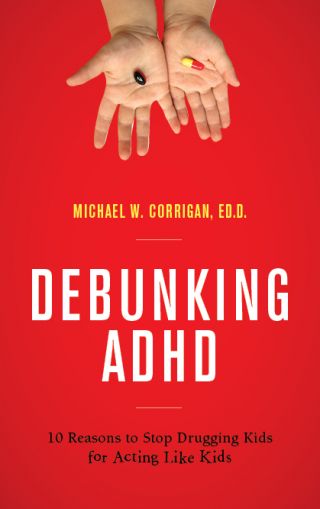ADHD
3 Facts All Parents Should Know About ADHD Stimulant Drugs
... And Discuss with Your Child's Doctor
Posted June 3, 2015
Medicating children for a host of mental disorders has become very popular in some parts of the USA. More than 8 million kids from 6 months to 17 years of age are on pharmaceutical drugs in this wonderful country. We lead the world in drugging youth for behavioral, cognitive and attention issues. We are once again #1. But from my little office not funded by the pharmaceutical industry, I am not so sure we should hit the streets quite yet chanting “USA—USA-- USA!”
In this blog I would like to share with parents as well as adults working with children a few not so readily available facts related to medicating kids for behavior issues. I am hoping these facts might encourage adults to be a bit more cautiously curious when it comes to drugging kids. I am hoping that even for adults with kids who have been on ADHD drugs for a long period of time, it becomes apparent there is no time better than the present to stop this practice.
Fact #1: Too Many Unknowns When It Comes to Long-term Use
If you were manufacturing a drug for kids to take daily for several years or more, that your research documents comes with a possible endless list of serious and life threatening side effects ranging from dependency to depression to death, how long would you want to track kids taking the drug to make sure it was safe and effective for them to take for extended periods of time? Most rational experts truly concerned about the health and safety of kids would probably want to consider conducting several studies that spanned at least a year or two. The possibility exists, however, that those selling such drugs for kids are neither rational or concerned.
You might not be aware of what little it takes for a pharmaceutical drug to be approved for purchase in the USA. Surprisingly enough, for a federal level process, at the end of the day it doesn’t require much. For those in the billion dollar pharmaceutical industry manufacturing drugs for those darn meddling kids, the FDA approval process apparently is even less stringent. Take for instance, the latest ADHD stimulant drug from Shire Pharmaceuticals called Vyvanse.
You see, Vyvanse was approved to be administered to millions of kids for years on end based upon two studies that followed 342 kids six to twelve years of age for three to four weeks. These kids were selected because they met the criteria to be diagnosed ADHD; which is not that hard to accomplish. If you don’t believe me, please take the “test”. The FDA’s approval was based upon reviewing these two studies that only attempted to show that kids behaved “better” than their control group counterparts.
There is no mention of medical tests taken during the study to monitor the effects of the drug on the kids’ nervous systems, brain functions, or internal organs. There was also no concern to see how the drugs affect infants, toddlers or preschoolers. Novartis, the makers of Focalin (aka the new and improved Ritalin), submitted two studies as well to the FDA. The studies to get Focalin approved by the FDA followed only 207 kids six to twelve years of age for four to six weeks.
Do you think the FDA approval process is requiring enough research to insure our children’s safety when it comes to pharmaceutical drugs? As my colleagues Robert Whitaker, Marilyn Wedge, Peter Breggin and many others working to get kids off of pharmaceutical drugs have documented, the pharmaceutical companies know a lot more about these drugs than they care to share or the FDA cares to consider. If you would like to see an example, please watch this video.
Fact #2: ADHD Stimulants are Addictive
Using any search engine, if you type in the words “medication guide” and the name of any ADHD stimulant marketed in the USA, what you will find is a full disclosure of all of the drugs’ side effects. But you also will notice how the pharmaceutical companies first warn that the drugs can cause heart failure, and then they admit the drugs can lead to dependency, which is nice way of saying they are addictive. This is why they are classified as a Schedule II Controlled Substance similar to meth and opium.
If they were not addictive, why would the manufacturers and doctors recommend seeking medical help before stopping use of the drug? The reason they recommend such procedures is to cover their butts and to help kids slowly wean themselves off of the addictive drugs to avoid withdraw symptoms. Similar to a heroin addict kicking the drug, they medicate the patient with Methadone and slowly lower the dosage level to avoid withdraw symptoms. Does this sound like something a child in preschool or grade school should have to do? Should we really be prescribing drugs, that could quite possibly lead to dependency, for kids just stumbling through the natural child development process and trying to figure out how to act in social settings?
Also, if ADHD stimulant drugs were not addictive, why do doctors have to continually up the dosage of the drug for their young patients as their daily use continues? Because similar to any person using an addictive drug, their system starts to build up a tolerance for the drug and as a result they “need more” of the drug. If ADHD stimulants are not addictive, why are students crushing them up and snorting them for a bigger “high”?
Studies show that ADHD stimulant medication has basically the same effect on a child’s brain as cocaine. The stimulants, similar to cocaine, take over the neurochemicals in our prefrontal cortex that guide how we think and behave. This cognitive coup is accomplished by the stimulants reducing the blood flow and nutrients being sent to the brain by 23-30%. Imagine your local reservoir trying to provide water to your community when only 2/3 full. The impact of the stimulants causes the brain to micro-hemorrhage (bleed) (Ellinwood & Tong, 1996), and research shows such effects can cause more than 50% of the users to develop drug-induced Obsessive Compulsive Disorders. In other words, what some want to sell you is a sign of the drugs helping a child to be less spontaneous, less hyper, and more likely to only focus on one thing, is actually reflective of the mind being medicated to malfunction daily for the rest of their childhood.
Most regretful, families are losing children to such addiction.
Fact #3: There is No Benefit to Long-Term Use of ADHD Drugs
I guess there is one study that gives us some insight about the long-term use of such drugs. The most comprehensive study done on the long-term use of ADHD drugs was published in 2009. The study was funded by the National Institute of Mental Health and is often referred to as the Multi-Modal Treatment Study on ADHD or 2009 MTA Study. The 2009 MTA was intended to follow up on the 1999 MTA Study, which claimed that ADHD drugs were more effective than behavioral therapy in the first 14 months of use. But guess what news the 2009 MTA Study publication shared?
After following kids for six to eight years, the 18 authors of the research (of which apparently only two were not being paid on the side by pharmaceutical drug companies) stated the study “fail[ed] to find better outcomes associated with continued medication treatment.” They went on to say that children still being given drugs by their parents six to eight years later “fared no better than their nonmedicated counterparts, despite a 41% increase in the average total daily dose, failing to support continued medication treatment as salutary.” Basically they found that after fourteen months the addictive drugs “effectiveness” began to dissipate and after three years the drug-treatment advantage was gone completely.
The individuals and groups promoting such drug use have no research supporting the value to keep children on these drugs for extended periods of time. All they really have are a few methodologically flawed studies that claim the drugs effectively treat the behaviors associated with ADHD for a few short months. As to if taking a drug that basically medicates the brain into malfunctioning and over stimulating a young child’s brain so that it is incapable of producing excessive thoughts that lead to exuberance and distraction is beneficial to the child, I will leave that debate for another day.
I know some clinicians and doctors might want to tell you different, but who are you going to believe? Are you going to take the word of the individual wanting to medicate your child so you have to come back every month to have your child’s heart, weight, growth and dosage level checked, aka pay for continuous office visits and tests for years on end, or are you going to believe the largest longitudinal study ever completed on the ineffectiveness of ADHD drugs and performed by doctors who work for the pharmaceutical industry? At the least ask your doctor if they have even read the 2009 MTA study, and if not share it with them for discussion purposes. Personally, I am still shocked by how so many who prescribe the drugs have not even heard about the study or the findings.
Summary
The reason I wrote my latest book on Debunking ADHD, is it just seemed surreal to me as to how so many are reliant today upon a drug to do what traditional parenting efforts and inspiring instruction has accomplished quite successfully for centuries? I realize such drugs in theory provide a quick fix for some very challenged circumstances, but just these three facts alone provide several reasons why we should question if it is worth the risk. Plus, who really wants to put children on mind-altering drugs, when decades of research on child development as well as effective parenting and teaching provide so many other viable options?
If you are a parent, grandparent or educator, you know all too well that raising children is one of the hardest demands we will experience in life. You have firsthand knowledge that kids can be quite annoying and trying at times. Despite not yet receiving their Ph.D. in psychology, they are masters of manipulating adults’ brains and nervous systems. No matter how hard we try or deeply we care, it is often nearly impossible to help them understand that their behavior must change, grow or mature. At times it seems equally frustrating to convince them that worrying about the small stuff, which can often lead to anxiety or depression, is something that must be better managed to truly enjoy life and accomplish success. As a psychologist, parent, educator and former problem child, I understand all too well such frustrations and also can understand the allure to the possibility that a pill can fix everything instantly.
But do you really think there is a pill capable of magically transmogrifying such children? Have you ever wondered if such pills are truly a healthy or safe option for kids with behavioral or attention issues? Have you ever thought about the risks of having kids in the prime of their developmental stages take such drugs for extended periods of time? Unfortunately the brochures selling such drugs printed by the pharmaceutical companies, and too often found in the pediatrician’s and clinician’s offices prescribing the drugs, do not share the whole truth related to such concerns with the average consumer. Unfortunately, they do not share with us that parenthood is not easy or that the behaviors they want to call symptoms of mental disorder are also typically classified as common behaviors associated with normal child developmental challenges.
These three facts I shared today are related to ADHD drugs, but the storyline is not that different when it comes anxiety and depression meds. There are many more facts that every adult or parent working with challenging children should be aware of when it comes to what they call “drug therapy”. And I hope this blog has encouraged you to seek more information. Our kids deserve nothing less.
Copyright © 2015 by Michael W. Corrigan, Ed.D.
Professor Corrigan’s most recent book, Debunking ADHD: 10 Reasons to Stop Drugging Kids for Acting Like Kids (link is external), goes deeper into child development and ideas for parenting children with behavioral or developmental challenges. Join him on Facebook, Twitter or YouTube to learn more! Corrigan and his colleagues also are organizing a series of one day seminars for parents, educators and practitioners. The educational and inspiring events are being scheduled in major metro areas. Please take a moment to learn more about the Project #ForTheKids on Facebook, and make plans to attend.





